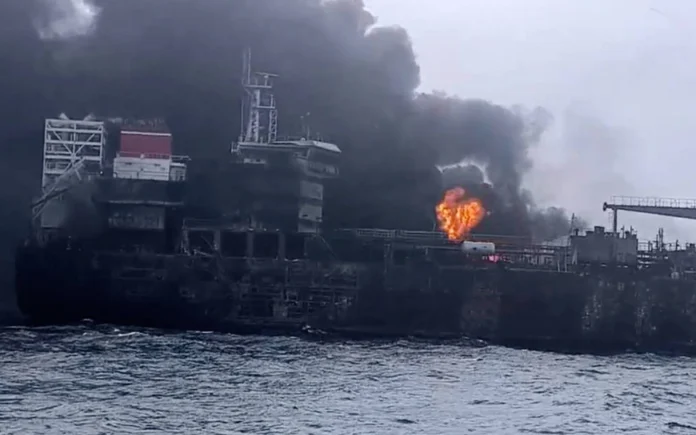Hull, England – A Russian cargo ship captain has been charged with gross negligence manslaughter following a deadly collision in the North Sea that left one crew member missing and presumed dead.
Vladimir Motin, 59, the captain of the Portugal-flagged MV Solong, was arrested in northeast England on Tuesday, a day after the vessel collided with the MV Stena Immaculate, a US military-contracted tanker carrying jet fuel. British authorities confirmed the charge against Motin on Friday, and he is set to appear in Hull Magistrates’ Court on Saturday.
Incident Details
The collision occurred approximately 16 kilometers off the Yorkshire coast in the early hours of March 11, sending shockwaves through maritime and defense communities. The MV Stena Immaculate, a stationary vessel at the time of impact, sustained significant structural damage. Smoke billowed from the MV Solong, raising immediate concerns about potential fuel leaks and fire hazards.
READ MORE: Putin Suggests US Ceasefire Plan for Ukraine Needs Serious Reworking
Authorities launched an extensive search operation for Mark Angelo Pernia, a 38-year-old Filipino crew member, who remains missing and is now presumed dead. Humberside Police confirmed that Pernia’s family is being supported by trained officers.
Legal Action and Investigations
Motin has been charged under gross negligence manslaughter, a serious offense under UK law that can lead to life imprisonment if convicted. Frank Ferguson, head of the Crown Prosecution Service’s Special Crime and Counter-Terrorism Division, stated that evidence pointed to significant failures in navigation and safety protocols aboard the MV Solong.
“The evidence gathered thus far suggests that this collision was preventable. The actions or inactions of the captain will be closely examined in court,” Ferguson said in a press briefing.
The UK Marine Accident Investigation Branch (MAIB) has launched an inquiry into the cause of the collision. Additionally, the United States and Portugal, the nations where the vessels are flagged, have initiated their own investigations.
Safety Violations and Past Inspections
Documents from Port State Control inspections reveal that the MV Solong had a history of safety deficiencies prior to the collision:
- July 2024 (Dublin, Ireland) – The ship failed emergency steering safety checks. Inspectors found the compass unreadable and identified inadequate alarms and improperly maintained survival craft.
- October 2024 (Scotland) – Further deficiencies were found, although the vessel was not detained.
Maritime experts have criticized lax enforcement of safety regulations, questioning why the vessel was allowed to continue operations despite repeated warnings. Captain John Radcliffe, a UK-based maritime consultant, said the incident highlights the need for stricter enforcement.
“It’s alarming that a ship with known safety issues was still in operation. This tragedy could have been avoided if previous violations had been taken more seriously,” Radcliffe said.
Reactions from the Shipping Industry and Governments
The incident has raised concerns within the global shipping industry, particularly regarding the enforcement of international maritime safety standards.
Ernst Russ, the German-based shipping company that owns the MV Solong, issued a statement expressing condolences to Pernia’s family and pledging full cooperation with the investigation.
“We are deeply saddened by this incident and are working closely with authorities to determine the cause of the collision,” the statement read.
Meanwhile, Russian diplomatic officials have called for fair legal proceedings for Captain Motin. Sergei Lavrov, Russia’s Foreign Minister, stated that Moscow is closely monitoring the case.
“We expect our citizen to receive a fair and unbiased legal process. The Russian government is ready to provide consular assistance if necessary,” Lavrov said during a press conference.
National Security and Military Implications
While UK authorities have ruled out immediate links to national security threats, the involvement of a US military-contracted tanker has drawn attention. Pentagon officials have stated that the MV Stena Immaculate was transporting jet fuel for US and NATO operations in Europe.
A US Department of Defense spokesperson acknowledged the collision but stated that there was no direct impact on military operations.
“The incident is a tragic loss of life, and we extend our condolences to the family of the missing crew member. However, there is no indication of foul play, and the tanker’s mission remains unaffected,” the spokesperson said.
Environmental and Economic Impact
Authorities continue to assess the environmental impact of the collision, particularly the risk of fuel leaks into the North Sea. The UK’s Maritime and Coastguard Agency has deployed response teams to monitor potential pollution.
Economically, the disruption of maritime traffic in the busy North Sea shipping lanes could have a ripple effect on global supply chains. Industry analysts predict short-term delays in fuel shipments and increased scrutiny of cargo ship safety protocols in European ports.
Future Maritime Safety Reforms?
This incident has renewed calls for stricter enforcement of maritime safety standards. The International Maritime Organization (IMO) is expected to review the case and may consider tighter regulations on vessel maintenance and captain training.
“There’s a growing need for real accountability in the shipping industry,” said Dr. Rachel Stevens, a professor of maritime law at the University of Southampton. “We cannot continue to allow vessels with multiple safety violations to operate unchecked.”
As the legal proceedings unfold, maritime authorities and industry leaders will be closely watching the outcome, hoping for changes that could prevent future tragedies.
Conclusion
The fatal collision in the North Sea has not only resulted in the loss of a crew member but has also sparked legal, political, and environmental debates. With Captain Motin now facing serious charges, the case will likely set a precedent for accountability in maritime operations.
As investigations continue and court proceedings begin, the global shipping community awaits answers on how and why this tragedy occurred—and what must change to prevent another.
